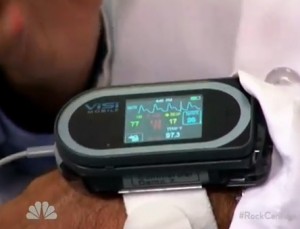Years ago I wrote a satirical article for the liberal weekly newspaper, Funny Times, on budget cutbacks in medical care in which I described, tongue-in-cheek, how heart attack sufferers would have to hold the phone to their chests to get an EKG. I never realized at the time (and therefore have to decline any credit as a visionary) that this would come true all too soon.
Dr. Eric Topol is the director of the Scripps Translational Science Institute in La Jolla, California. He is also an iconoclast who was responsible for the pain reliever Vioxx ® being removed from the market and a pioneer in the future of medical diagnosis.
 His vision for the use of medical apps in the Smart Phone reveals that major changes in the way medicine is practiced loom on the horizon. At present, we can use modified Smart Phones to take EKG’s (yes, by holding them to the chest!), do an ultrasound of the heart and keep a constant check on a diabetic’s blood glucose. Topol tells us a sensor smaller than a grain of sand is being developed that will pick up precursors warning of impending heart attack and a special phone ring will alert you to get to the hospital, often weeks before an actual heart attack occurs.
His vision for the use of medical apps in the Smart Phone reveals that major changes in the way medicine is practiced loom on the horizon. At present, we can use modified Smart Phones to take EKG’s (yes, by holding them to the chest!), do an ultrasound of the heart and keep a constant check on a diabetic’s blood glucose. Topol tells us a sensor smaller than a grain of sand is being developed that will pick up precursors warning of impending heart attack and a special phone ring will alert you to get to the hospital, often weeks before an actual heart attack occurs.
I predict that in the next few decades we will all be able to have a small implant that will constantly monitor our bodies for multitudes of indicators and receive timely medical care very early on in the course of the illness. Perhaps a custom analysis of our DNA will allow the implant to be modified to anticipate ailments to which we may be predisposed.
Perhaps a down side to this scenario is that if our Smart Phone can monitor all this data then so could others such as the government (shades of 1984!), even computer hackers could access our location and our most intimate personal data. Imagine the effect of a computer virus that announced to fifty million people simultaneously that they were having heart attacks.
Of course Alexander Graham Bell was a major medical innovator who also invented the audiometer, still used for testing hearing, and did early research on respirators, x-ray and other latter-day “medical apps” (see Amazing Medical Stories, Goose Lane Editions, 2003)
I can’t help but believe current developments of the phone would have put a great big smile on his face!
Dr. Eric Topol discusses some amazing medical innovations
On NBC’s Rock Center
Photo Credits
Images are screen captures from the Video Dr. Eric Topol on NBC’s Rock Center


🙂 Thanks for a great article.
This technology is definitly something we need to learn how to use. It can be life saving not just in medical crisis but in prevention as well.
Being involved in the field of both emergency management and response, allow me a prediction of my own: that this technology will have a great impact on field response, and on the training of first responders !
The availability of these aps and the amount of info they provide has already started to change the world, in many ways for the better! The down side unfortunately is that it is also rendering the same world incredibly more vulnerable.
Knowledge we now need to memorise will fade as we come to depend more and more on instant access to the information required.
Any device can and does, eventually, have failures. Lets hope we all stay aware of that possibility and make sure we maintain our brain’s ability to remember the essential knowledge required to save lives.
This unfortunately is easier said than done since the world we live in encourages multitasking.
An ability that is coming to be known for its negative impact on our memory.
Thanks again
Carol A. Namur
.
The science fiction writer, Isaac Asimov, wrote a story in the 1950’s about a device which heralded the modern calculator and resulted in the general populace totally forgetting how to do basic mathematics. It has come all too true!